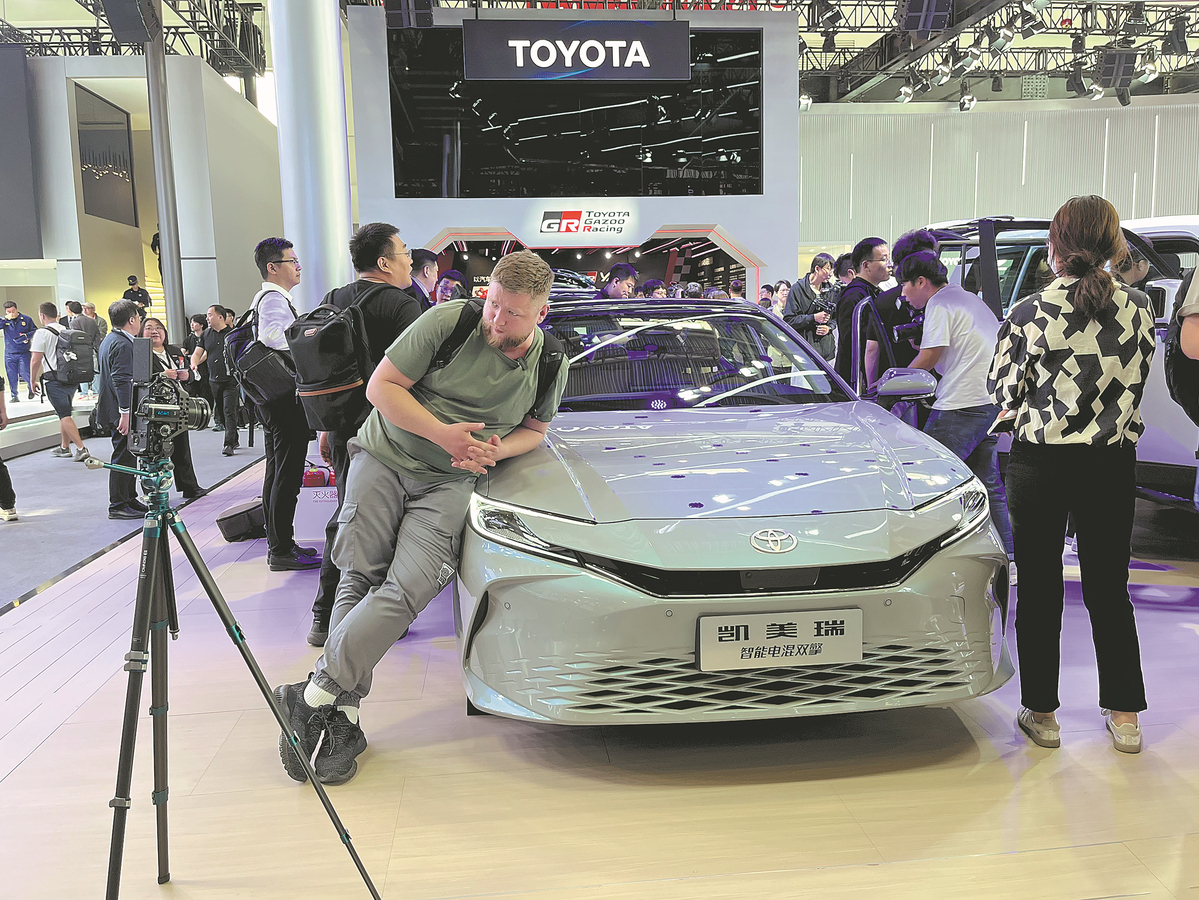Nation's tech sought out by automakers from abroad

Foreign automakers are increasingly teaming up with Chinese tech companies to introduce cutting-edge technologies like artificial intelligence in vehicles, targeting the preferences of tech-savvy customers in China, the world's largest auto market.
Toyota, the world's largest automaker by sales, announced a partnership with Chinese information technology company Tencent to develop advanced intelligent driving solutions at the 2024 Auto China, which concluded on May 4.
Tencent, owner of China's largest messaging app, WeChat, will provide cutting-edge technologies like AI and cloud computing for Toyota's software-defined cars. They are to connect users' lifestyles with Toyota's mobility services and create a diverse mobile transportation ecosystem, according to the deal.
Similarly, Japanese automaker Nissan signed a memorandum of understanding with Chinese tech company Baidu to collaborate on AI and smart car technologies. This includes joint development and research, and integrating Baidu's AI solutions into Nissan vehicles in China.
Nissan CEO Makoto Uchida said Nissan needs to meet the needs of Chinese customers at the same speed at which the market is changing. The collaboration aims to offer smart systems and AI-based mobility services locally and globally.
"If we cannot do those aspects, I think it is very difficult to keep our business in China," he said.
The deals highlight the fact that multinationals are realizing in order to keep pace with Chinese automakers, who are prioritizing electric vehicles and advanced tech, they need to incorporate similar tech into their models, according to industry experts.
German auto giant Volkswagen has done so much earlier, including joint ventures with China's AI chip provider Horizon Robotics and software group ThunderSoft, as well as an investment in China's EV startup Xpeng to codevelop high-end EVs for the local market.
"Four years ago, I thought it was almost certain that the Chinese car companies just follow the global manufacturers, but right now it seems like everything has changed," said Xie Tiandi, a spokesperson for DJI Automotive, a company spun out of the world's biggest drone maker which is now working with Volkswagen on assisted driving technologies, as quoted by the Financial Times.
Industry experts attribute this to China's vast consumer market and diverse driving conditions, which assist the development of new energy vehicle technologies, as well as the higher acceptance of intelligent technologies among Chinese consumers.
More than 40 percent of components in intelligent NEVs are new categories not found in traditional fuel-powered cars, necessitating innovative supply chains, which have been established in China, industry experts said.
As a result, the market landscape is shifting as Chinese brands gain ground over foreign counterparts. The China Passenger Car Association's data show that in March, China's passenger car market saw retail sales reach 1.69 million units, up 6 percent year-on-year. Domestic brands' sales surged by 19 percent to 930,000 units, while mainstream joint venture brands' sales dropped by 8 percent to 500,000 units.
Foreign brands' market share continued to decline in the same month: German brands held a market share of 20.4 percent, down 1.5 percentage points year-on-year; Japanese brands accounted for 13.8 percent, a decrease of 2.2 percentage points; US brands held 8.2 percent, down 1.8 percentage points.
Their lost market share was captured by Chinese brands, whose market share increased by 6 percentage points year-on-year to 54.8 percent in March.
BYD Chairman Wang Chuanfu estimates that in the next three to five years, the market share of joint venture brands will decrease from 40 percent to 10 percent, representing the growth potential of Chinese brands.
According to forecasts from Counterpoint Research, China will have 1 million cars with Level 3 driving-assisted technology, which means drivers can remove their hands from the steering wheel, by 2026. These vehicles will account for about 10 percent of new cars by 2028.
At the 2024 Auto China, the rise of AI was shaping trends, with Chinese car companies competing in digitization and intelligence capabilities.
Xpeng unveiled its Tianji smart cabin operating system, which can mimic users' driving habits and assist in various driving scenarios. "Smart cars have become a key area of AI technology application," said He Xiaopeng, chairman of Xpeng. He noted that AI not only enhances the user experience but reflects the rapid development of AI companies.
Baidu-Geely joint venture Jidu unveiled the 01 and 07 models which feature the Ernie Bot, Baidu's ChatGPT-like large language model, enabling voice-controlled car functions and remote operation of home appliances.
Meanwhile, Huawei's Pangu large model, iFlytek's Spark large language model and 360 Security's Zhinao model have begun to be installed in vehicles.

